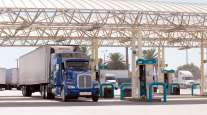Features Coordinator
South Carolina Begins Six-Stage Phase-In of 12-Cent Fuel Tax Increase

On July 1, South Carolina began a six-year trek that will raise taxes on gasoline and diesel fuel by 2 cents a gallon each July into 2022.
When the process is complete, the Palmetto State will tax diesel and gas at 28 cents a gallon, an increase of 12 cents. The rate had been 16 cents for 30 years through June 30.
The fuel-tax increase by the General Assembly was completed in May and had to overcome a May 9 veto by first-year Gov. Henry McMaster. Both legislative houses overturned the veto the following day.
Trucking endorsed the increase that will bring millions more dollars to repairing and improving South Carolina’s roads and bridges.
“Our fuel tax has been stupid low,” South Carolina Trucking Association President Rick Todd said.
“You don’t celebrate tax increases, but we’re just glad to get it done and hope the road improvements happen posthaste. There are glaring differences in terms of road-system quality between our sister states and South Carolina,” Todd said.
The South Carolina Department of Transportation sees this as a much-needed revenue bump.
“There have been some smaller program revenue increases, but there has not been an overall gas tax increase in South Carolina since 1987 and you do what you can when you’re 30 years behind,” said Pete Poore, director of communications for SCDOT.
South Carolina taxes diesel and gas at the same rate.
State DOT officials said they will mainly use the increased funding on four areas of improvement: bridge replacement, road resurfacing and rehabilitation, widening 140 miles of interstate highways and safety projects.
Todd called the tax hike a necessary evil.
“It is the cost of doing business,” he said. DOT estimates the increase will generate an additional $600 million annually for transportation projects when fully phased in. Poore said the first order of business is to tackle much-needed safety projects.
“South Carolina has the highest highway death rate in the country, and we have identified that about 30% of our fatalities occur on rural highways,” he said. “We plan to invest an additional $50 million a year from the new revenue and put it into the safety program.”
According to the American Society of Civil Engineers in its Infrastructure Report Card published earlier this year, South Carolina has more than 950 structurally deficient bridges and 16% of the state’s roads are in poor condition.
“We want to fix our roads, we want to increase safety, and we want to enhance mobility,” Poore said.




